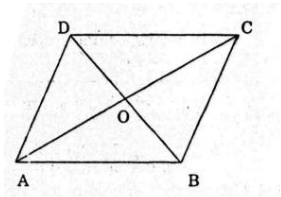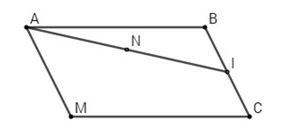Bài 1: Cho tam giác \(ABC\) . Hãy xác định các vec tơ
\(\eqalign{
& \overrightarrow {AB} + \overrightarrow {BC} \,\,;\,\,\,\,\,\,\overrightarrow {CB} + \overrightarrow {BA} \,\,;\,\,\,\,\,\overrightarrow {AB} + \overrightarrow {CA} \,\,;\,\,\,\,\overrightarrow {BA} + \overrightarrow {CB} \,\,;\, \cr
& \overrightarrow {BA} + \overrightarrow {CA} \,\,;\,\,\,\,\,\,\,\overrightarrow {CB} – \overrightarrow {CA} \,\,;\,\,\,\,\,\overrightarrow {AB} – \overrightarrow {CB} \,\,;\,\,\,\,\overrightarrow {BC} – \overrightarrow {AB} \,\,.\, \cr} \)

Ta có
\(\eqalign{
& \overrightarrow {AB} + \overrightarrow {BC} \,\, = \overrightarrow {AC} \,\,\,\,\, \cr
& \overrightarrow {CB} + \overrightarrow {BA} \,\, = \overrightarrow {CA} \,\,\,\,\,\,\,\,\,\, \cr
& \overrightarrow {AB} + \overrightarrow {CA} \,\, = \,\overrightarrow {CA} \, + \,\overrightarrow {AB} \, = \,\overrightarrow {CB} \,\,\,\,\,\,\,\,\,\,\,\,\,\,\,\, \cr
& \overrightarrow {BA} + \overrightarrow {CB} \,\, = \overrightarrow {CB} + \overrightarrow {BA} = \overrightarrow {CA} \cr} \)
\(\overrightarrow {BA} + \overrightarrow {CA} = \overrightarrow {BA} + \overrightarrow {AD} = \overrightarrow {BD} \) (Với \(D\) thỏa mãn \(\overrightarrow {CA} = \overrightarrow {AD} \), tức \(D\) là điểm đối xứng với \(C\) qua \(A\)).
\(\eqalign{
& \overrightarrow {CB} – \overrightarrow {CA} = \overrightarrow {AB} \cr
& \overrightarrow {AB} – \overrightarrow {CB} = \overrightarrow {AB} + \overrightarrow {BC} = \overrightarrow {AC} \cr} \)
\(\overrightarrow {BC} – \overrightarrow {AB} = \overrightarrow {BC} + \overrightarrow {BA} = \overrightarrow {BE} \) (Với \(E\) là điểm sao cho \(BCEA\) là hình bình hành).
Bài 2: Cho ba điểm \(O, A, B\) không thẳng hàng. Tìm điều kiện cần và đủ để vec tơ \(\overrightarrow {OA} + \overrightarrow {OB} \) có giá là đường phân giác của góc AOB.

Gọi \(C\) là điểm sao cho \(AOBC\) là hình bình hành.
Ta có \(\overrightarrow {OA} + \overrightarrow {OB} = \overrightarrow {OC} \),
Advertisements (Quảng cáo)
\(OC\) là phân giác của góc \(AOB\) khi và chỉ khi \(AOB\)C là hình thoi.
\( \Leftrightarrow \,\,OA = OB\).
Bài 3: Gọi \(O\) là tâm của hình bình hành \(ABCD\). Chứng minh rằng với điểm \(M\) bất kì, ta có
\(\overrightarrow {MO} = {1 \over 4}(\overrightarrow {MA} + \overrightarrow {MB} + \overrightarrow {MC} + \overrightarrow {MD} ).\)


Do \(ABCD\) là hình bình hành nên \(O\) là trung điểm của \(AC, BD\).
Advertisements (Quảng cáo)
Suy ra \(\overrightarrow {OA} + \overrightarrow {OC} = \overrightarrow 0 \,,\,\overrightarrow {OB} + \overrightarrow {OD} = \overrightarrow 0 \,.\)
Ta có
\(\eqalign{
& \overrightarrow {MA} + \overrightarrow {MB} + \overrightarrow {MC} + \overrightarrow {MD} = \overrightarrow {MO} + \overrightarrow {OA} + \overrightarrow {MO} + \overrightarrow {OB} + \overrightarrow {MO} + \overrightarrow {OC} + \overrightarrow {MO} + \overrightarrow {OD} \cr
& \,\,\,\,\,\,\,\,\,\,\,\,\,\,\,\,\,\,\,\,\,\,\,\,\,\,\,\,\,\,\,\,\,\,\,\,\,\,\,\,\,\,\,\,\,\,\,\,\,\, = 4\overrightarrow {MO} + \overrightarrow {OA} + \overrightarrow {OB} + \overrightarrow {OC} + \overrightarrow {OD} = 4\overrightarrow {MO} \cr
& \Rightarrow \,\,\overrightarrow {MO} = {1 \over 4}(\overrightarrow {MA} + \overrightarrow {MB} + \overrightarrow {MC} + \overrightarrow {MD} ). \cr} \)
Bài 4: Cho tam giác \(ABC\).
a) Tìm các điểm \(M\) và \(N\) sao cho
\(\overrightarrow {MA} – \overrightarrow {MB} + \overrightarrow {MC} = \overrightarrow 0 \) và \(2\overrightarrow {NA} + \overrightarrow {NB} + \overrightarrow {NC} = \overrightarrow 0 .\)
b) Với các điểm \(M, N\) ở câu a) , tìm các số \(p\) và \(q\) sao cho
\(\overrightarrow {MN} = p\overrightarrow {AB} + q\overrightarrow {AC} .\)


a) Ta có \(\overrightarrow {MA} – \overrightarrow {MB} + \overrightarrow {MC} = \overrightarrow 0 \, \Leftrightarrow \,\overrightarrow {BA} + \overrightarrow {MC} = \overrightarrow 0 \)
\( \Leftrightarrow \,\overrightarrow {CM} = \overrightarrow {BA} \,.\) Do đó \(ABCM\) là hình bình hành.
Gọi \(I\) là trung điểm của \(BC\), ta có \(\overrightarrow {NB} + \overrightarrow {NC} = 2\overrightarrow {NI} \) suy ra \(2\overrightarrow {NA} + 2\overrightarrow {NI} = \overrightarrow 0 \)
\( \Rightarrow \,\,\overrightarrow {NA} + \overrightarrow {NI} = \overrightarrow 0 \,\,\,\, \Rightarrow \,N\,\) là trung điểm của \(AI\).
b) Từ câu a), ta biểu diễn \(\overrightarrow {AM} ,\,\overrightarrow {AN} \) qua \(\overrightarrow {AB} ,\,\overrightarrow {AC} \).
\(\eqalign{
& \overrightarrow {MA} – \overrightarrow {MB} + \overrightarrow {MC} = \overrightarrow 0 \,\, \Leftrightarrow \, – \overrightarrow {AM} – (\overrightarrow {AB} – \overrightarrow {AM} ) + (\overrightarrow {AC} – \overrightarrow {AM} )=\overrightarrow 0 \cr
& \,\,\,\,\,\,\,\,\,\,\,\,\,\,\,\,\,\,\,\,\,\,\,\,\,\,\,\,\,\,\,\,\,\,\,\,\,\,\,\,\,\,\,\,\, \Leftrightarrow \,\overrightarrow {AM} = – \overrightarrow {AB} + \overrightarrow {AC} \cr
& 2\overrightarrow {NA} + \overrightarrow {NB} + \overrightarrow {NC} = \overrightarrow 0 \,\, \Leftrightarrow \, – 2\overrightarrow {AN} + \overrightarrow {AB} – \overrightarrow {AN} + \overrightarrow {AC} – \overrightarrow {AN} = \overrightarrow 0 \cr
& \,\,\,\,\,\,\,\,\,\,\,\,\,\,\,\,\,\,\,\,\,\,\,\,\,\,\,\,\,\,\,\,\,\,\,\,\,\,\,\,\,\,\,\, \Leftrightarrow \,4\overrightarrow {AN} = \overrightarrow {AB} + \overrightarrow {AC}\Leftrightarrow \overrightarrow {AN}= {1 \over 4}(\overrightarrow {AB} + \overrightarrow {AC} ) \cr
& \Rightarrow \,\,\overrightarrow {MN} = \overrightarrow {AN} – \overrightarrow {AM} = {1 \over 4}(\overrightarrow {AB} + \overrightarrow {AC} ) + \overrightarrow {AB} – \overrightarrow {AC} = {5 \over 4}\overrightarrow {AB} – {3 \over 4}\overrightarrow {AC} \cr} \)
Vậy \(p = {5 \over 4}\,;\,q = – {3 \over 4}.\)

